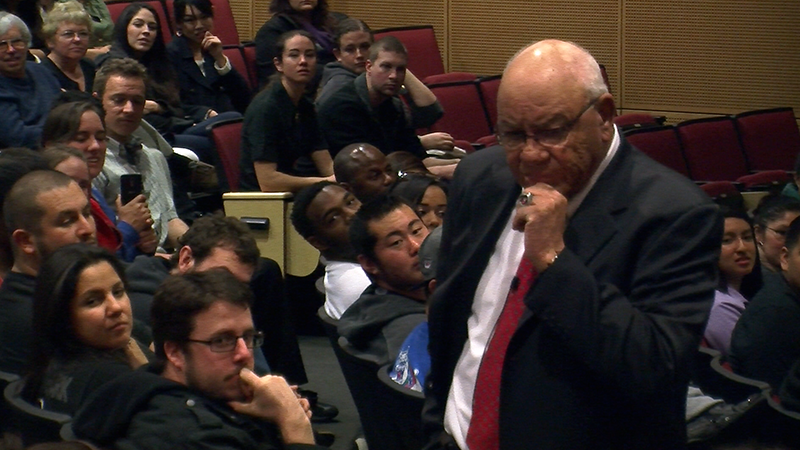
Coach Herman Boone, the assertive and dynamic force behind the 1971 T.C. Williams Titans that finished their high school football season undefeated and ranked second in the nation, is a creator of history — and a unifier.
He was faced with unifying a divided community after the desegregation of T.C. Williams High increased racial tensions.
He was faced with having to unify his team and think beyond the barriers of black and white.
But on Friday night, when he talked before an eager and anxious crowd at Fresno State after a CineCulture screening of “Remember the Titans,” the multimillion-dollar grossing film based on Boone and his ’71 Titans, he faced another obstacle.
Boone, with a hoarse yet still-stern-and-resonant voice, was suffering a common ailment in the Valley: allergies.
“These allergies out here are kicking my butt,” said Boone, a Florida resident, during an interview before the film’s screening.
The 77-year-old retired coach now travels from coast to coast as a public speaker, and he came to Fresno State speaking on behalf of Black History Month.
He has made and lived through history. And now, he has one goal: preserving it.
“I realize that much of black history has been dehumanized, and in many cases, lost,” Boone said.
“I’m asked every year, usually by a young white student, ‘Coach Boone, why do have to celebrate Black History Month? Why can’t we just all celebrate America History Month?’ And that’s a good question.
“It appears to me that much of our history today is being treated as history. We see history, we hear history, we forget about history.”
In the film, Oscar Award-winning actor Denzel Washington portrayed Boone as a no-nonsense coach — a family man yearning to unify his players.
But there were obstacles.
The film depicted Boone’s players as being hard-nosed and hotheaded. The white players and black players refused to accept each at the start.
There were discrepancies, too.
It has been previously revealed that “Ray,” a character in the movie who befriends team leader Gerry Bertier and is subsequently kicked off the team after an unwillingness to accept his black teammates, did not exist in real life.
It was a facet of the movie that was over exaggerated.
But one part of the film that Boone said was grossly under exaggerated was the level of harassment his family endured during the tumultuous time.
There is one scene in the movie where someone throws a brick through Boone’s window. In real life, it wasn’t a brick; it was “a whole toilet stool,” Boone said, “filled to the brim.”
And how did Boone feel after watching the film?
“I look at it like I’m sitting at a church at my own funeral listening to the preacher preach my funeral — and I wanna stand up and say, ‘that didn’t happen. This happened. That didn’t — this, that, this,” Boone said, waving his hands in different directions for emphasis.
“I really don’t know what to say. I’m elated. I’m elated that a man of Denzel Washington’s status went to Jerry Bruckheimer and said, ‘I want this film.’”
In the film, Boone wanted his team to achieve the perfect blend of respect, trust and compassion amongst each other — and overcome adversity for the sake of diversity and equality.
Real life was no different.
“What is it that I have that deserves a movie to be made? For the first time in my life I had wondered if I had made a difference,” Boone said.
“I found by demanding that young people respect each other where respect becomes trust and trust thus then becomes the emotion of glue that will bind communities together, then I knew that I had made a difference.”
There is an ever-emphatic scene in the film when assistant coach Bill Yoast huddles the team together during a game in which they are trying to mount a comeback. He tells them, “You make sure they remember forever the night they played the Titans.”
The team’s unification and perseverance was part of a larger context in history.
That’s what Boone wants people to remember.
“You were put on this earth to make a difference,” Boone said. “And one of the differences that you are expected to make is to carry the history of those that have preceded you and many who have died for you — far more than Dr. King and Malcolm X. Far more than any one person.”





